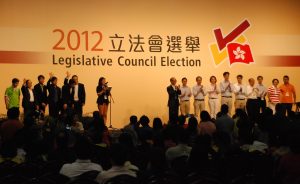Memo #288
With a raft of elections in the offing, Beijing must soon decide if it will give Hong Kong its promised democracy.
By Jonathan Manthorpe – jonathan.manthorpe [at] gmail.com
 This June 4 will mark the 25th anniversary of the Chinese government’s crackdown on the pro-reform demonstrators in Beijing’s Tiananmen Square. Nowhere will that memory resonate more strongly than in Hong Kong, where over a million people took to the streets in 1989, both in solidarity with the Chinese demonstrators and in affirmation of their own aspirations. Coming a mere eight years before Hong Kong’s return to Chinese sovereignty after 156 years of British rule, the denouement in China seemed to many Hongkongers a repudiation of Beijing’s promise to rapidly introduce full democracy in its regained territory.
This June 4 will mark the 25th anniversary of the Chinese government’s crackdown on the pro-reform demonstrators in Beijing’s Tiananmen Square. Nowhere will that memory resonate more strongly than in Hong Kong, where over a million people took to the streets in 1989, both in solidarity with the Chinese demonstrators and in affirmation of their own aspirations. Coming a mere eight years before Hong Kong’s return to Chinese sovereignty after 156 years of British rule, the denouement in China seemed to many Hongkongers a repudiation of Beijing’s promise to rapidly introduce full democracy in its regained territory.
That pessimism has proved well founded. Neither the composition of the territory’s legislature nor of the government, made up of the Chief Executive and his Executive Council, are democratically chosen by the more than seven million people of Hong Kong. Until now, Beijing has stalled on the issue. But the day is approaching when clear answers to the questions of Hong Kong’s future political dispensation must be answered. Within the next few weeks the Hong Kong government is expected to seek Beijing’s approval for proposals for elections governing the selection of the Legislative Council (known as the LegCo) in 2016 and the Chief Executive in 2017.
The LegCo has 70 members, half of them directly elected and half nominated by “functional constituencies” (professional and business organizations that are beholden to Beijing, thus giving the Chinese government effective control of the legislature). In the 2020 elections all the LegCo members will be directly elected. But an important indication of the way the wind is blowing in Beijing will be whether it is prepared to expand the number of freely elected LegCo members before then.
The main bone of contention, however, will be the election of the Chief Executive – Hong Kong’s government leader – in 2017. This will be by direct popular vote rather than, as currently, by a committee selected by Beijing. But Hong Kong’s mini-constitution, the Basic Law, specifies that a nominating committee must approve candidates for Chief Executive. The issue is how this committee will be formed. Will it be broadly representative of Hong Kong society, or will it be composed of people who will only allow Beijing-sanctioned candidates to stand for election?
About the Author:
Jonathan Manthorpe has been a foreign correspondent for Canadian newspapers for nearly 40 years and for over 20 years has specialised in reporting on Asia. You can read more his columns on international affairs here.

Results being announced in the 2012 elections for the Hong Kong Legislative Council (LegCo) (credit: VOA).
Links:
- Bloomberg News, “Hong Kong Seeks to Sap Democracy Protests, Anson Chan says,” March 2014
- New York Times, “Hong Kong’s shaky Democratic Future,” March 2014
Comments are closed, but trackbacks and pingbacks are open.